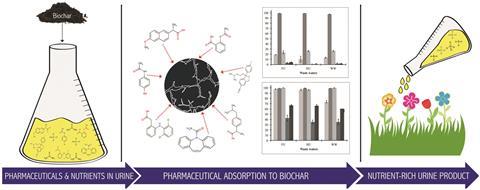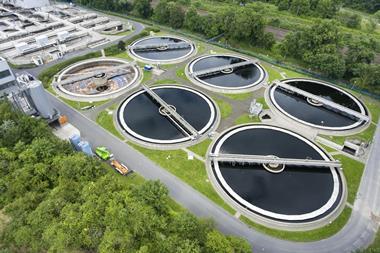Method for cleansing waste urine could see it used as a fertiliser
US researchers have demonstrated that biochar, essentially burnt plants, can remove pharmaceuticals from urine waste streams. The findings could help recycle urine into agricultural fertilisers.
Human urine is rich in nitrogen and phosphorus – just what plants need. However, human urine can also contain pharmaceuticals, the release of which cause worrying developmental effects in aquatic ecosystems, hampering its use as a fertiliser. While some wastewater treatment plants recover nutrients from urine and wastewater, they do not typically remove pharmaceuticals. Current pharmaceutical removal systems involve membranes, electrodialysis and activated carbon, but they can be costly, energy intensive and unsustainable.

Now, Avni Solanki from the University of Florida and Treavor Boyer from Arizona State University, have studied biochar, a precursor to activated carbon, to see if it could work as a viable alternative. Biochar is a cheap porous material produced by burning biomass, such as woods or grasses. Biochar’s functionality and surface charge, which depend on its source as well as the pH and composition of the wastewater, allow it to bind pharmaceuticals through π–π and electrostatic interactions. At high doses, biochar can extract more than 90% of pharmaceuticals from urine, while removing less than 20% of nitrogen and phosphorus species, with woody-based biochar performing best due to its micropores.
‘We wanted to look at a low-cost material that all countries could use [for wastewater management], whether developed or developing,’ says Solanki. They were also excited ‘to see that something this cheap with such a low environmental footprint could actually be applied for pharmaceutical removal and nutrient recovery.’
‘The idea and the results are really nice … They show that you can remove so much of the pharmaceuticals without removing much of the nutrients,’ comments Håkan Jönsson, an expert in environmental engineering from the Swedish University of Agricultural Sciences. While Mahesh Ganesapillai, an expert in waste management and nutrient recovery from VIT University, India, comments that the work ‘is a step in the direction of nutrient recovery from human urine providing experimental results that could help validate urine-diverting sanitation systems’.
References
This article is free to access until 12 April 2017
A A Solanki and T Boyer, Environ. Sci.: Water Res. Technol., 2017, DOI: 10.1039/c6ew00224b











No comments yet